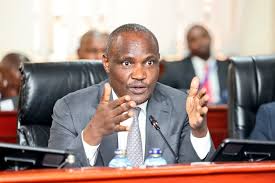
Treasury Cabinet Secretary John Mbadi has reiterated that the government’s plan to fully adopt electronic procurement will proceed, despite opposition from Parliament and ongoing legal challenges.
Appearing before the National Assembly’s Committee on Delegated Legislation on Thursday, Mbadi said the electronic Government Procurement system (e-GP) is essential in promoting transparency and curbing corruption in public spending.
Data from the e-GP portal indicates that only 21 contracts have been awarded since the system was rolled out in July this year.
The committee, chaired by Ainabkoi MP Samuel Chepkong’a, had in August recommended that a Treasury circular directing all public entities to use the e-GP system be withdrawn, arguing that it contravened the Constitution.
The House later rejected the circular.
During the session, Mbadi urged the committee to reconsider its position and support the initiative, saying the move was in the country’s best interest. He noted that significant sums continue to be lost through manual procurement systems.
“As a country, we must change how we do things. We cannot have excuses. We don’t have enough money to run our activities, yet a lot of funds are being lost through manual procurement,” Mbadi said.
“We have to decide to reverse the trend by embracing e-procurement where it is practical,” he added, maintaining that the system complies with the law.
The CS observed that many procurement entities still prefer manual methods and emphasised the need to encourage a shift to digital systems.
“The Executive is promoting e-procurement. We must all do the same. As the National Assembly, I plead that you also support us,” he said.
“We are one government and should not appear to be sending mixed signals to procurement entities that it is wrong to go electronic,” he added.
The Treasury has organised webinars to train users across national and county governments on key functionalities of the e-GP platform, as it works to address challenges that have slowed implementation.
According to Planning Principal Secretary Cyrell Odede, the webinars, which began on Tuesday, November 10, will run until November 21, 2025. Participants are required to register through links available on the e-GP Kenya website under the “News” tab.
Phase One of the e-GP system will include e-tender preparation, e-tender submission, e-bid security and guarantee management, e-tender opening and evaluation, framework agreements, and e-contract management.
The first phase will cover state departments, Parliament, the Judiciary, constitutional commissions, independent offices, state corporations, semi-autonomous government agencies (SAGAs), universities, county corporations, and water companies.














